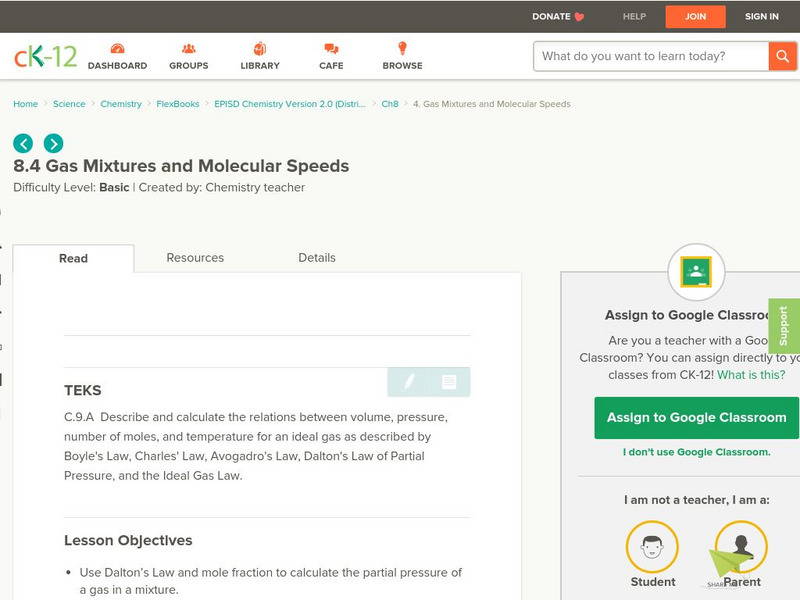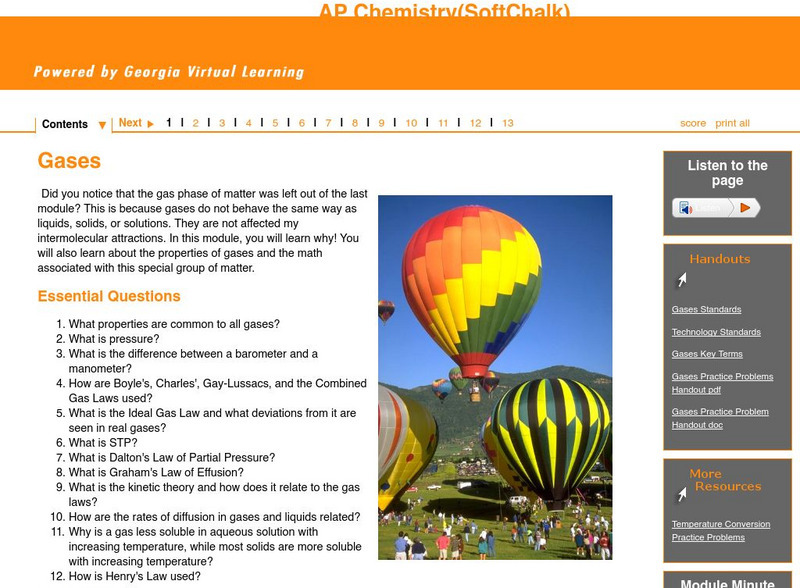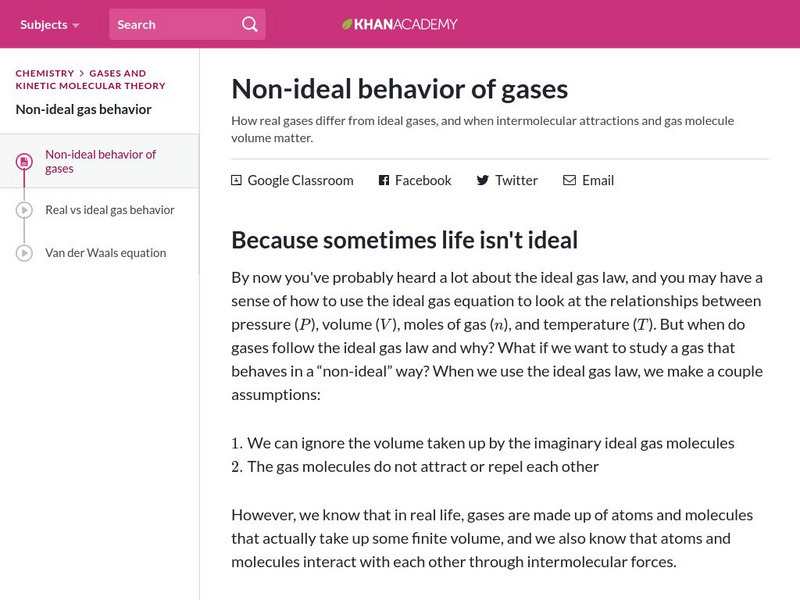Curated OER
Chemical Compounds
In this chemical compounds worksheet, students identify the types of intermolecular forces present in the given substances, calculate the heat required to convert a liquid to gas, and explain the ideal-gas law. This worksheet has 5...
Curated OER
Combined Gas Law
For this combined Gas Law worksheet, 7th graders determine the volume of the gas at a specific temperature and pressure amount. Then they explain what happens when the tank cools and the pressure of the gas increases. Students also...
Curated OER
Gas Law Homework Problem Set
In this chemistry instructional activity, students determine the mass of the gas when filling a bicycle tire with nitrogen. Then they determine the volume of a balloon when at specific altitudes. Students also determine the partial...
Curated OER
Gas Laws Experienced
Students discover relationship between temperature pressure and volume as they perform research and experiments.
Curated OER
Blast Off to Learning
Students explain the laws of volume and pressure, identify what a limiting reagent is and why it is important in a chemical reaction, and distinguish between fossil fuels and renewable energy sources.
Curated OER
Chemistry Review
In this chemistry overview activity, students review stoichiometry, states of matter, thermochemistry, gas laws, chemical bonding, molarity, chemical equilibria, and kinetics. This activity has 41 problems to solve.
Curated OER
Gas Law Problems
In this gas law problems worksheet, students research and answer nineteen unique questions associated with gas laws. Students work in pairs to answer the twenty questions asked.
Curated OER
Can or Bottle Crusher (Demonstration)
Learners witness the gas law from a demonstration in which a can collapses after the steam escapes. The steam pushes out most of the air from inside the can and then the air outside presses against the can crushing it.
Concord Consortium
Concord Consortium: Stem Resources: Gas Laws
A learning module with built-in interactive features where students can read background information on each gas law, then explore the interrelationships of pressure, temperature, and volume. Covers Boyle's Law, Charles's Law,...
CK-12 Foundation
Ck 12 Exploration Series: Simulations: Physics: Runaway Balloon
[Free Registration/Login Required] Ever lost a balloon that floated into the air? In this simulation learn how to combined gas law could help you understand the balloon's motion.
Georgia Department of Education
Ga Virtual Learning: Chemistry: Gas Laws
Through informational text, interactive practice problems, virtual simulations, and video clips, students learn about the gas laws.
Shodor Education Foundation
Shodor: Gas Laws
An excellent site for understanding and applying the ideal gas law. The combined and other variations of the ideal gas law are derived. There are sample application problems with an abbreviated method of solving the problems.
TED Talks
Ted: Ted Ed: Describing the Invisible Properties of Gas
This video explores how scientists use principles such as gravity to describe and study the properties of gases. [3:27] Followed by a short quiz and a list of additional resources to explore.
Simon Fraser University
Chem1 Virtual Textbook: The Basic Gas Laws
The General Chemistry Virtual Textbook, or Chem 1, is broken into several sections covering various aspects of topics related to chemistry. This section deals specifically with a series of gas laws including Boyle's law, Charles and...
Ohio State University
Betha Chemistry Tutorial
This site resource offers tutorials on the gas laws, balancing chemical equations, and quantum mechanics.
Other
Chemical Heritage Foundation: Robert Boyle
A biographical site on the life and work of Robert Boyle.
Royal Society of Chemistry
Royal Society of Chemistry: Gridlocks: Level 3
A collection of grid puzzles that cover a wide variety of topics in advanced high school chemistry. These are excellent for topic review and reinforcement. The puzzles can be played online and also downloaded as worksheets. Answers are...
CK-12 Foundation
Ck 12: Gas Mixtures and Molecular Speeds
[Free Registration/Login may be required to access all resource tools.] The following online tutorial helps students use Dalton's Law and mole fraction to calculate the partial pressure of a gas in a mixture. They will learn to calculate...
Georgia Department of Education
Ga Virtual Learning: Ap Chemistry: Gases
In this module, you will learn why gases are not affected by intermolecular attractions! You will also learn about the properties of gases and the math associated with this special group of matter.
Khan Academy
Khan Academy: Dalton's Law of Partial Pressure
Use this tutorial to understand Dalton's Law of partial pressure, and then answer some interactive practice questions to review the material.
Khan Academy
Khan Academy: Calculations Using the Ideal Gas Equation
Practice calculating pressure, volume, temperature, and moles of gas using the ideal gas equation.
Khan Academy
Khan Academy: The Equilibrium Constant K
Reversible reactions, equilibrium, and the equilibrium constant K. Learn how to calculate K, and how to use K to determine if a reaction strongly favors products or reactants at equilibrium.
Nobel Media AB
The Nobel Prize: The Nobel Prize in Physics 1910 Award Ceremony Speech
Here is the full text of the 1910 Nobel Prize in Physics presentation speech. given by Professor O. Montelius. It describes Johannes Diderik van der Waals' scientific contributions, which earned him the Nobel Prize in Physics.
Khan Academy
Khan Academy: Non Ideal Behavior of Gases
Find out how real gases differ from ideal gases, and when intermolecular attractions and gas molecule volume matter.

























